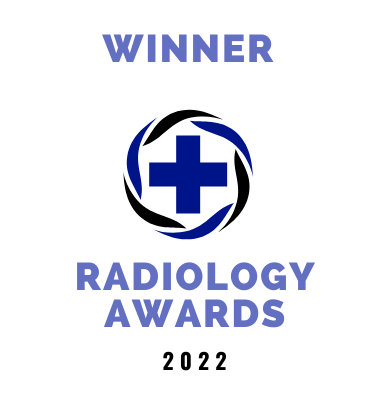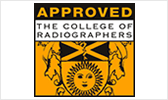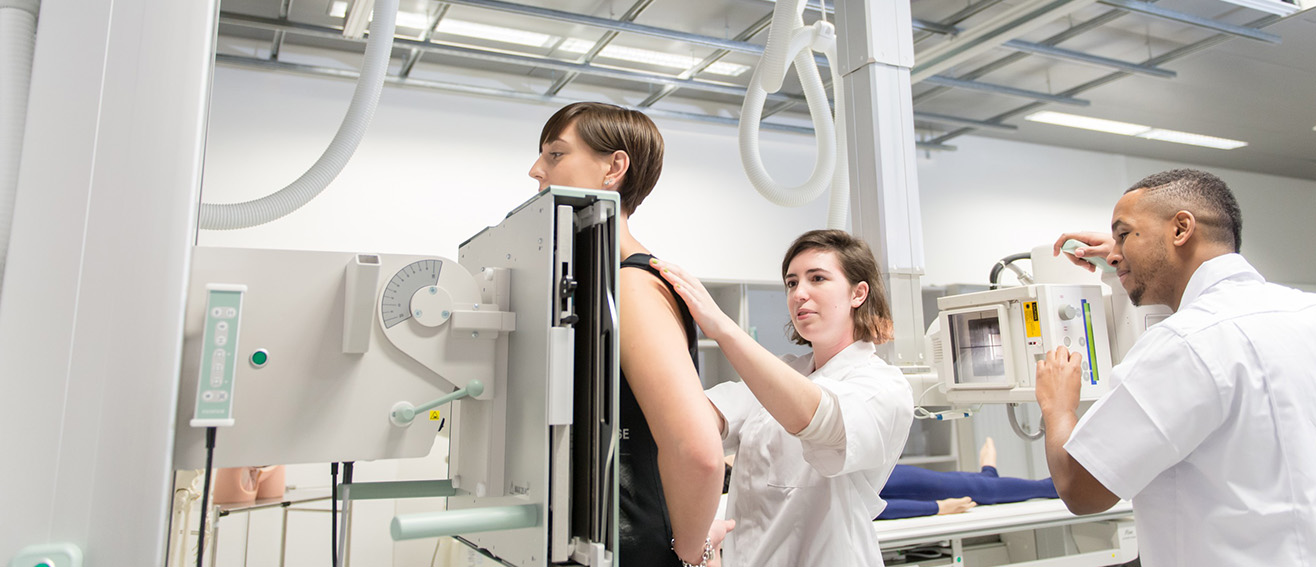Overview
Radiography is a critical tool at the technological forefront of the fast-changing healthcare environment. Its importance makes it a dynamic and developing profession that’s highly in demand, and this course will set you up for a successful career as a Diagnostic Radiographer. You’ll combine academic study with clinical practice at your employing radiology department to graduate with all the skills you need to produce the highest quality images while providing patients with excellent care. You’ll then be able to apply for registration with the Health and Care Professions Council (HCPC) as a Diagnostic Radiographer, enabling you to take your first post in your exciting career.
This course provides an all-encompassing experience that enables you to put theory into practice. We have an excellent working relationship with our numerous specialist clinical training sites who offer an excellent overall student experience and contribute to the development of well rounded newly qualified Diagnostic Radiographers, ready to take on the exciting challenge of the first post after graduation.

Our BSc Diagnostic Radiography programme was awarded the Diagnostic Radiography Course of the Year 2022, Radiology Awards 2022
Why Diagnostic Radiography at LSBU?
- user-md
- Ranked 2nd in London overall for Health Professions (Guardian University Guide 2023).
- comments
- Approved by the Health and Care Professions Council and accredited by the Society and College of Radiographers.
- check-circle
- On completion, you can apply for registration with the Health and Care Professions Council as a diagnostic radiographer.
- medkit
- Gain clinical experience in many of London's internationally renowned teaching hospitals.
- heartbeat
- Access to the Digital Diagnostic X-ray Room and the Digital Interpretation Lab.
- rocket
- LSBU Health and Social Care graduates are the second highest paid amongst all London Modern university graduates, and the sixth highest in the UK one year after graduating (DfE LEO data 2022).
| ModePart-time | DurationUp to 36 Months Practical Period & 1 Months EPA (37 months) | Start dateSeptember | Application code5812 | Application method Direct to LSBU |
Watch our video to see how you can make yourself at home studying at LSBU.
Location
London South Bank University student union is located at 103 Borough Rd, London SE1 0AA.
If you are visiting our Southwark Campus, you may wish to use our downloadable campus map (PNG File 466 KB). For information on accessibility, see our DisabledGo access guides. See our location page for more details.
Entry Level Requirements
Need further information? Call us on 0800 923 8888 to discuss entry requirements.
It is anticipated that applicants will have a wide a variety of academic backgrounds, but should possess one of the following:
- A Level BBC in Science or;
- BTEC National Diploma DMM in Science or professionally relevant subject or;
- Access to HE Diploma in Science or similar with 24 Distinctions of which 14 must be in Science or;
- Equivalent level 3 qualifications also considered or;
- Applicants must hold 5 GCSEs A-C including Maths, English and Science or equivalent (reformed GCSEs grade 4 or above).
Additional entry requirements
- Employment within an appropriate radiology department
- All Applicants must be 18 years or over at the commencement of the course
- Satisfactory outcome at interview
- Provide satisfactory references
- Occupational health clearance
- Enhanced Disclosure Barring Service (DBS)
- Proof of ordinary residency
- A valid passport required for enrolment purposes
- Personal qualities and values in line with those expected by the NHS constitution
English language
Those whom English is not their first language must achieve a minimum score of 7.0 overall or equivalent with not less than 7.0 in the listening and reading sections and not less than 7.0 in the writing and speaking sections for the International English Language Test Score (IELTS) at the time of application.
Interview
If your initial application to a Health and Social Care course is successful, you’ll be invited for an interview.
Visit our interview page for information on preparing for the day and what to bring.
Advanced entry
If you have already completed some studies at another university, we may be able to consider you for advanced entry. Please see our advanced entry page for more information.
Choose your country
Select country here:
Missing English and Maths qualifications?
If you do not have the required English and Maths qualifications needed to satisfy the entry requirements for this programme, we have courses available at our partner College that you can take to upskill in these areas. Find out more at South Bank College.
Home
| Mode Part-time | Duration Up to 36 Months Practical Period & 1 Months EPA (37 months) | Start date September | Application code 5812 | Application method Direct to LSBU |
An Apprenticeship Standard is comprised of a programme of study, an End Point Assessment and on-the-job learning. This means that in addition to meeting academic requirements, you’ll need to be employed in a role related to your apprenticeship. The process of applying depends on whether you have an employer to sponsor (and support) you.
If you are employed and your employer has confirmed they will support your apprenticeship:
You are welcome to submit an application via our application system. You’ll need to provide details of your employment/employer as part of the application. You’ll also need to ensure you and your employer meet the requirements – find out who can be an apprentice to see if you meet the entry requirements and employer commitments to find out more about your employer’s role.
If you are not employed:
- You will need to find a job role related to the apprenticeship you wish to apply for, with an employer who is happy to support you. If you would like to find an employer to support your apprenticeship with LSBU, you can search which employers are currently advertising Apprenticeships via the National Apprenticeship Service website searching for ‘London South Bank University’ as keywords.
- If there are no search results, this means there are currently no vacancies. We update our vacancies regularly, so please do check back regularly.
- Many employers advertise their apprenticeship vacancies on their websites or via other portals. You could search for ‘find an apprenticeship’ online.
- When you’re ready to apply, see the government's advice on how to write a winning apprenticeship application and make your application.
Further information for apprentices
If you’re a prospective apprentice, you can find out more about who can be an apprentice on our student pages.
Further information for employers
If you’re an employer, you can find information about the employer commitments and further related information on the related pages for business.
See our admissions policy 1.5 MB and complaints policy 516.0 KB.
Prepare to start
There are steps the apprentices, the employer and the University need to complete before you start your course. Take a look at the steps to be completed in the Enrolment section. Employers may also like to look at our steps to offering an apprenticeship.
- Introduction to Radiation Science
This is a foundation module aimed at students who'll be working with ionising radiation in a clinical environment. The module will introduce the basic concept of atomic structure and will then build on this to explain how x-rays are produced and how radiation interacts with matter. Fundamentally, this module will concentrate on using radiation in a safe manner and will therefore include sessions on radiobiology (including genetics), radiation protection (including personal dosimetry and QA) and the legislation surrounding the use of ionising radiation in the clinical environment. Level 4. 20 Credits. Formative assessment: Mock examination. Summative assessment: 2-hour unseen written examination. 40% pass mark. 100% weighting. - Systemic Anatomy and Physiology 1
The module is designed to provide knowledge of the anatomy and physiology of the following key body systems: integumentary, respiratory, gastrointestinal, cardiovascular, and urinary. Some aspects of the physiology and pathology of the musculoskeletal system will also be addressed. Level 4. 20 Credits. Formative assessment: Mock examination. Summative assessment: 2 hour unseen written examination. 40% pass mark. 100% weighting. - Principles of Clinical Reasoning in Medical Imaging
This module offers a foundation for students undertaking the diagnostic imaging pathway. It provides a context for the practice of diagnostic imaging and a basic insight into the radiological environment and associated general principles. In addition, the module introduces the skills of clinical reasoning and reflection, evaluating information to facilitate evidence-based practice, and problem-solving within the context of the clinical environment. Level 4. 20 Credits. Formative assessment: 500 word draft or plan of summative assignment. Summative assessment: 3000 word written assignment OR, 20 minute podcast. 40% pass mark. 100% weighting. - Concepts of Interprofessional and Collaborative Practice
This module will introduce you to the place and value of inter-professional and collaborative working in health and social care delivery. The module aims to support the development of the necessary communication, personal, partnership working and reflective practice skills required to meet the needs of clients/carers and diverse populations who are at the centre of inter-professional health and social care delivery. You'll work collaboratively online to explore and develop an understanding of the purpose, scope and range of inter-professional and collaborative working. Assessment method: 100% coursework. 20 credits. - Medical Imaging Practice 1
This module continues to develop student’s clinical skills and competence in the practice of routine, conventional diagnostic imaging and introduces specialist modalities such as CT, ultrasound and nuclear medicine. Level 5. 40 Credits. Formative assessment: Mock examinations and continuous clinical monitoring via clinical portfolio Summative assessment: Semester 1 a 2 hour unseen written examination 50% weighting, Semester 2 a 1 hour unseen workstation examination 50% weighting, and Clinical Portfolio Pass/Fail. Students are required to achieve a pass in all elements of assessment. - Medical Imaging Modalities
This is module aimed to develop students understanding of specialist imaging modalities and their application in a clinical environment. The module will introduce the basic concept of image production of IR, CT, MRI, ultrasound and nuclear medicine. Level 5. 20 Credits. Formative assessment: Group presentation. Summative assessment: Poster presentation examination. 40% pass mark. 100% weighting. - Systemic Anatomy and Physiology 2
The module is designed to provide knowledge of the anatomy and physiology of the following key body systems: reproductive, vascular and hepatobiliary. Level 5. 20 Credits. Formative assessment: Mock examination. Summative assessment: 2 hour unseen written examination. 40% pass mark. 100% weighting. - Medical Imaging of Pathology and Disease Processes
This module aims to provide students with knowledge of common disease processes in selected body systems and recognise the impact these diseases have on other systems. Level 5. 20 Credits. Formative assessment: 500 word draft or plan of summative assignment. Summative assessment: 3000 word written assignment OR, 20 minute podcast. 40% pass mark. 100% weighting - Appraising Evidence for Research Informed Practice
This module aims to develop students’ appreciation for the role of research and evaluation in contemporary healthcare practice. This is done by enabling students understanding of the research process by teaching them how to read, interpret and appraise primary research that is relevant to practice. Level 5. 20 Credits. Formative assessment: 500 word draft or plan of summative assignment. Summative assessment: 3000 word written assignment. 40% pass mark. 100% weighting. - Medical Imaging Practice 2
This module continues to develop student’s clinical skills and competence in the practice of routine, conventional diagnostic imaging and introduces specialist modalities such as CT, ultrasound and nuclear medicine. Level 5. 40 Credits. Formative assessment: Mock examinations and continuous clinical monitoring via clinical portfolio Summative assessment: Semester 1 a 2 hour unseen written examination 50% weighting, Semester 2 a 1 hour unseen workstation examination 50% weighting, and Clinical Portfolio Pass/Fail. Students are required to achieve a pass in all elements of assessment. - Professional Identity, Autonomy and Accountability
This module has a focus on accountability, professional behaviours and continual professional development. Level 6. 20 Credits. Formative assessment: 500 word draft or plan of summative assignment. Summative assessment: 3000 word written assignment OR, 20 minute podcast. 40 % pass. 100% weighting - Interpretation of Medical Imaging
This module offers the student an opportunity to interpret radiographic images. This module will provide the student with the advanced clinical perspective necessary for them to make an effective and safe contribution in their first clinical appointment. Level 6. 20 Credits. Formative assessment: Mock written exam. Summative assessment: 2-hour unseen work station written examination. 40% Pass mark. 100% Weighting - Contemporary Issues in Medical Imaging
The main focus of the module will be an understanding of the application of evidence-based practice within diagnostic imaging. It seeks to address emerging topics which are of importance to imaging practitioners, service users and health care providers. It is essential that this module maintains a contemporary focus throughout and therefore the indicative content, within a broad structure, will be governed to some extent by changes in health care policy and areas of student interest. Level 6. 20 Credits. Formative assessment: 500 word draft of the summative assignment. Summative assessment: 3000 literature review. 40% pass mark. 100% weighting - Improving quality, change management and leadership
This module is the final interprofessional learning module that will explore leadership, quality improvement and change within organisations from an interprofessional perspective. The module looks at a strategic, evidence based approach to change management in a range of environments. Level 6. 20 Credits. Formative assessment: 500 word draft or plan of summative assignment. Summative assessment: 3000 word written assignment OR, 20 minute podcast 100% weighting. - Medical Imaging Practice 3
This module continues to develop student’s clinical skills and competence in the practice of routine, conventional diagnostic imaging and introduces specialist imaging such as MRI, neuroradiology, cardiac and breast imaging. Level 6. 40 Credits. Formative assessment: Mock examinations and continuous clinical monitoring via clinical portfolio Summative assessment: Semester 1 a 2 hour unseen written examination 50% weighting, Semester 2 a 1 hour unseen workstation examination 50% weighting, and Clinical Portfolio Pass/Fail. Students are required to achieve a pass in all elements of assessment.
Year 1
Year 2
Year 3
Careers
Graduates from this course are eligible to apply for registration as a diagnostic radiographer with the Health and Care Professions Council (HCPC), allowing them to practice within the NHS as well as the private sector both in the UK and abroad.
The programme is accredited by the Society and College of Radiographers and successful completion confers eligibility to apply for registration with the Health and Care Professions Council (HCPC).

The Health and Care Professions Council is the regulator of health, Psychological and Social professionals

The Society and College of Radiographers is the professional body representing the radiography workforce

Our BSc Diagnostic Radiography programme was awarded the Diagnostic Radiography Course of the Year 2022, Radiology Awards 2022
Teaching and Assessment
Study Year |
Semester 1 (September – January)
| Semester 2 (January – June) | Summer (June – August) | Credits |
Year 1 (months 1-12) | LSBU and work-based learning | LSBU and work-based learning | Work-based learning | 120 |
Year 2 (months 13-24) | LSBU and work-based learning | LSBU and work-based learning | Work-based learning | 120 |
Year 3 (months 25-36)
| LSBU and work-based learning | LSBU and work-based learning | Work-based learning | 120 |
| Total | 360 credits for award |
A varied teaching and learning diet is used to allow apprentices to learn in a variety of ways and build competence.
- Module co-ordinators provide material online and are encouraged to explore the use of online technologies that provide virtual teaching and assessment environments
- Lectures will be used to introduce and provide new information and update existing knowledge
- Tutorials with individuals and groups
- Academic workshops, including problem-based learning activities
- Formative assessments
- Skills lab workshops to prepare apprentices for clinical placements
- Critical incident analysis to reflect upon practice-based issues
- Structured reading/guided study
- Workbooks to develop and update knowledge
- Online group work and e-learning strategies
- Small group exercises
Resources
Resources include:
- Large and small teaching spaces.
- Skills laboratories, including specialist Diagnostic Radiography laboratory
- Manual and Handling suites (Hospital, ward set up)
- Computer laboratories.
- Library.
- Work-based learning environments.
Apprentice-Directed Learning
Apprentice-directed learning is an important feature. Apprentices receive a high level of direction and structure to support them in developing the skills and abilities to be able to direct their own learning at the beginning of the programme. Over time, the level of support and structure decreases as the programme develops with the apprentice becoming increasingly autonomous through being able to direct and manage their own learning.
Work-based learning
For apprentices, learning within and from the workplace can bring advantages. For example, it has been suggested that the gap between learning in higher education and learning at work can be narrowed (Tynj’al’a, 2008) and learners can develop capable practice, and support personal development.
Personal tutoring
As a Health and Social Care student, you will be allocated a named tutor during your first three weeks at LSBU. The role of your tutor is to be your primary contact for academic and professional development support.
Your tutor will support you to get the most of your time at LSBU, providing advice and signposting to other sources of support in the University. They should be the first person at the university that you speak to if you are having any difficulties that are affecting your work. These could be academic, financial, health-related or another type of problem.
Teaching Staff
Staff who teach on the course come from the Division of Radiography and ODP and more specifically are trained and experienced Diagnostic Radiographers, with input from other Divisions in the Institute of Health and Social Care. Service users and people with lived experience also contribute to delivery of the course.
People profiles

Register your interest
Apprentice Guide
Download our guideContact information
Course Enquiries - UK
Tel: 0207 815 7500
No results were found


